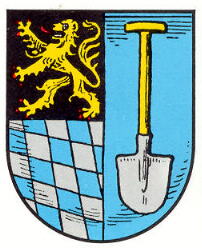Friesenheim (Ludwigshafen): Difference between revisions
Knorrepoes (talk | contribs) m (Text replacement - "/Arms of " to "/Arms (crest) of ") |
Knorrepoes (talk | contribs) m (Text replacement - "{{media}}" to " {{de1}} {{media1}}") |
||
| Line 25: | Line 25: | ||
The arms are based on the oldest known seal of the village, dating from 1716. The lion is the lion of the Pfalz, the diamonds are the arms of the Wittelsbach family, Kinigs of Bayern and the Pfalz. The village historically belonged to the Pfalz. The spade is taken as a village symbol, and may refer to the building of dikes to prevent the village from flooding by the Rhine. | The arms are based on the oldest known seal of the village, dating from 1716. The lion is the lion of the Pfalz, the diamonds are the arms of the Wittelsbach family, Kinigs of Bayern and the Pfalz. The village historically belonged to the Pfalz. The spade is taken as a village symbol, and may refer to the building of dikes to prevent the village from flooding by the Rhine. | ||
{{ | |||
{{de1}} | |||
{{media1}} | |||
[[Civic Heraldry Literature - Germany|'''Literature''']]: Debus, 1988. | [[Civic Heraldry Literature - Germany|'''Literature''']]: Debus, 1988. | ||
Revision as of 11:36, 26 December 2022
This page is part of the German heraldry portal Deutsche Wappensammlung |
Heraldry of the World |
|
German heraldry:
|
Selected collector's items from Germany:
|
FRIESENHEIM
State : Rheinland-Pfalz
Urban district (Stadtkreis) : Ludwigshafen
Incorporated into : 1891 Ludwigshafen
| German |
Gespalten und rechts geteilt, oben rechts in Schwarz ein rotbewehrter und -bezungter goldener Löwe, unten rechts von Silber und Blau gerautet, links in Blau ein silberner Spaten mit goldenem Stiel und Griff. |
| English | (Ludwigshafen) No blazon/translation known. Please click here to send your (heraldic !) blazon or translation |
Origin/meaning
The arms were granted on December 24, 1845.
The arms are based on the oldest known seal of the village, dating from 1716. The lion is the lion of the Pfalz, the diamonds are the arms of the Wittelsbach family, Kinigs of Bayern and the Pfalz. The village historically belonged to the Pfalz. The spade is taken as a village symbol, and may refer to the building of dikes to prevent the village from flooding by the Rhine.
Literature: Debus, 1988.


